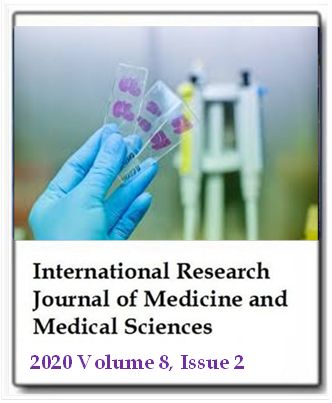Thermal and pH sensitivity of avian corona and influenza viruses: A model study for inactivation of SARS-CoV-2 (COVID-19) and other flu viruses
Mohammed Alimul Islam, Sumaiya Islam, Md. Enamul Haque, Md. Muklesur Rahman, Md. Asir Uddin, A.K.M. Khasruzzaman, Md. Mohiuddin Sharif, Md. Rajibur Rahman, Mohammad Robed Amin and Md. Mortuza AliInternational Research Journal of Medicine and Medical Sciences
Published: June 12 2020
Volume 8, Issue 2
Pages 42-56
DOI: https://doi.org/10.30918/IRJMMS.82.20.028
Abstract
Present study has been designed to clarify the mechanism of inactivation of the RNA enveloped viruses in-vitro. For that, avian Coronavirus (Avian Infectious Bronchitis Virus, AIBV) and Bird flu virus (Low Pathogenic Avian Influenza Virus, LPAIV, H9N2) were selected for this study. Both the viruses were subjected to heat (25 to 70°C and pH (1.0 to 14.0) treatment for 1 to 120 min and 30 s to 5 min respectively and their infectivity was checked by measuring virus titre through hemagglutination (HA) test, chicken embryo inoculation and RT-iiPCR. The results clearly indicates that both the viruses required 55°C for 90 min, 60°C for 60 min, 65°C for 15 min and 70°C for 2 and 3 min respectively to inactivate. Results of pH sensitivity using various detergents and chemicals exposure indicates that the agents having moderate acidic pH (5.0 to 6.0), neutral to moderate alkaline pH (7.0 to 10.0) and extreme alkaline pH (13.0 to 14.0) could inactivate AIBV within 20 to 30 s and the H9N2 virus was inactivated in pH range <3.0 and 13.0 to 14.0 within 5 min. The 70% ethanol or isopropanol was found highly effective to inactivate both the viruses in a minute. More interestingly, juice of various citrus fruits also exhibited antiviral activities in-vitro. Results of the present study indicated that the enveloped RNA viruses of any families could easily be inactivated using very cheap and available chemicals and detergents. Chicken embryos propagation and molecular detection by RT-iiPCR also indicated that ultra-acidic and extreme alkaline pH and higher temperature treatment successfully inactivated both the viruses. Finding of the present study also indicated that any viruses of the family coronaviridae including SARS-CoV-2 and other respiratory viruses of human and animal can be inactivated easily by exposure at high temperature and extremely low and high pH treatment.
Keywords: Avian infectious bronchitis virus (AIBV), low pathogenic avian influenza virus (H9N2), SARS-CoV-2 (COVID-19), thermal inactivation, pH treatment, chicken embryo inoculation, RT-iiPCR.
Full Text PDFThis article is published under the terms of the Creative Commons Attribution License 4.0

